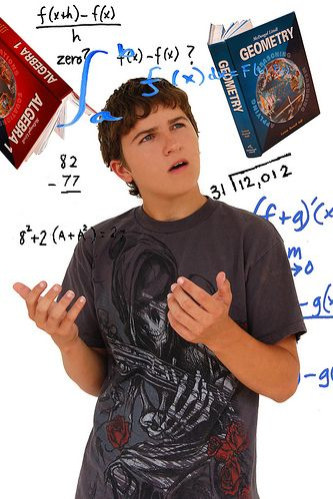Researchers Find Biological Reason Why You Can't Do Math

Math is one of those subjects in high school that you either can do or you cannot, with everyone falling on one side of the fence or the other. Whether you like it or not, math can either feel like a familiar task or like you're reading a foreign language. But researchers have identified a reason to which you can point to say that it is not your fault. Math problems require your brain to communicate back and forth between hemispheres in a way that is not necessarily true of other courses.
There are two regions in the brain that are responsible for completing functions in math. The parietal cortex is in the center top region of the brain, and plays a role in our ability to process numerical function. The right parietal region is in one hemisphere, and is involved with basic quantity processing, like guessing how many jellybeans are in a jar. The left parietal region is in the other, and is involved with more precise operations like addition and subtraction.
Researchers had pinpointed each area's function, but had been unable to determine whether they work together. The study, published in Cerebral Cortex journal, attempted to find out.
The study was conducted by Joonkoo Park, Denise Park, and Thad Polk, from Duke University, the University of Texas, and the University of Michigan, respectively. They used functional magnetic resonance imaging, or fMRI, to measure the brain activity of 27 healthy young adults while they completed basic numerical and arithmetic tasks. One task asked respondents to judge whether two groups contained the same or different numbers of items. Other tasks asked them to solve addition and subtraction problems. None of the problems were particularly difficult.
The fMRI confirmed the previous research on the roles of the right parietal region and the left parietal region. Researchers also found that arithmetic tasks caused communication to increase drastically compared to the numerical ones. In fact, people whose connection between the hemispheres was the strongest, also solved subtraction problems most quickly.
The study may have particular ramifications for people with dyscalculia, the numerical equivalent of dyslexia. It suggests that the connection between their hemispheres is impaired or inefficient. "If such a causal link exists," Joonkoo Park said in a statement, "one very interesting avenue of research would be to develop training tasks to enhance parietal connectivity and to test whether they improve numerical competence."
Researchers also suggest that such a program may benefit young children, as well as older adults with cognitive issues - and maybe just people rusty in math.
Published by Medicaldaily.com



























